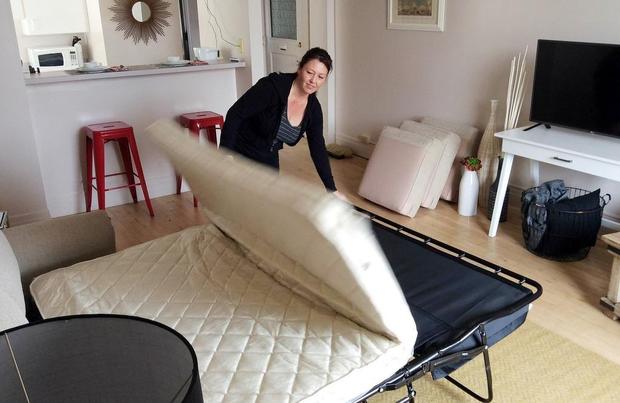By Audrey Dutton And Zach Kyle
The Idaho Statesman.
Tallulah Hall, who lives in Eagle, is a frequent seller in a new marketplace.
Hall works full time from her home as a property investor. For years, she has watched the pets of family members, friends and acquaintances. She discovered that her home’s spacious yard with a creek is an especially good romping ground for visiting dogs. So when she learned of Rover.com from an online advertisement, Hall signed up to become a semiprofessional pet sitter.
“It’s constant. I have a lot of requests,” she said. “I’ve had to turn people away.”
About 20 pet sitters are active on Rover.com. They set their own prices (Hall charges $25 a night) and their own terms (Hall requires pets to be spayed or neutered and up to date on vaccinations, and she limits her pet-sitting engagements to three dogs).
It is a job, with income tax forms provided at the end of the year. But she talks about it as if she’s getting paid to do something fun — and work she finds rewarding in a deeper way.
“Even people who I know, who pay me directly, I have them go through Rover as well,” she said. “I think it helps promote a really great company. … They’re there to promote the business of having dogs visit people, rather than be stressed out in a kennel.”
Rover.com, based in Seattle, isn’t the only website out there linking pet owners with pet sitters. There are 88 pet sitters listed in the Boise area at Care.com; five at DogVacay.com; 28 at PetSitter.com; and 99 within 10 miles of Downtown Boise at SitterCity.com. They include college students, teachers, veterans and retirees.
You can find anything on the Internet. You can order groceries to your front door. Become an ordained minister. Graduate from college. Arrange an unblind date.
Now, the rise in “sharing economy” businesses in the Boise area also makes it possible to order a vacation rental, hire a dog sitter, get a ride home or summon help for moving — all from people who, for the most part, are ordinary residents who have no business infrastructure. No storefronts, no offices outside their homes. They’re independent contractors whose freelance work is enabled by mobile tech.
As with any convenience, there are caveats. The “sharing economy” is not really sharing; it’s more like a “hire-on-demand” economy.
And it’s buyer and seller beware, as municipalities including Boise try to figure out how to regulate these fast-spawning businesses. Whether they need regulation at all is an issue. One local entrepreneur argues that sharing-economy businesses self-regulate by offering customer reviews, often providing liability insurance and in some cases collecting taxes.
MOVING YOU FROM A TO B
Rideshare company Uber is perhaps the best-known on-demand service in the world, with drivers in 63 countries and about 60 U.S. cities, including Boise. Drivers undergo background checks with the company, though cities, including Boise, have found access to those reports lacking. The drivers work as independent contractors, using their cars to pick up passengers requesting rides whenever the drivers log in as available on the Uber app, which sets prices based on distance.
Passengers requesting rides from their smartphones can see what drivers are available, including a description of a driver’s vehicle and their cumulative rating from past passengers, as well as an estimated fare before accepting the ride. The driver also has a chance to accept or decline the request. Payment is automated, using the credit or debit card passengers enter into the app when they create accounts. Uber keeps 20 percent of fares.
Since starting operating in Boise, nearly 200 drivers have accepted Uber fares, providing nearly 10,000 trips, according to the company.
Like many other cities where Uber operates, Boise and Uber butted heads over regulation. The city proposed rules that treated Uber drivers like taxi drivers, including requiring commercial driver licenses. Uber, based in San Francisco , temporarily stopped its service in the area and said its business model couldn’t work under the proposed regulations.
The Idaho Legislature ended the stalemate by passing a law preventing Idaho cities from regulating Uber and other ride-hailing companies. Uber immediately resumed operations.
Scott McCurdy, Boise City Taxi general manager, said Uber struck a victory against “overreaching” city regulation, though rules for taxis haven’t changed. He said it’s too early to say how Uber is affecting local taxis. “May the best player win,” he said.
MOVING YOUR STUFF
Clayton Cart wanted to find a part-time job that would fit between working 47 hours a week at a concrete construction supply job during the summer and a full-time course load at Boise State University in the fall. For Cart, a sophomore studying criminal justice who has a baby on the way, finding a job with flexible hours was the only way to make his schedule work.
A student friend recruited Cart to sign up for Bellhops, an on-demand moving service. Bellhops, based in Chattanooga, Tenn., develops software that connects wanting moving help with college students looking for jobs.
Bellhops operates in 134 cities and plans to launch in 40 more in the next year. The company won’t disclose how many moves it has completed, other than to say it’s in the “tens of thousands” annually.
Cart was among the first of about 30 Bellhops to sign up in the Treasure Valley. He has worked two Bellhops jobs, each time loading and unloading a moving truck with another Bellhop who’d taken the job through the app.
A typical move requires a two-person team. The team captain, who follows up on app notices to work out appointment details with customers, earns $15 per hour, Cart said. The partner, or “wingman,” earns $13 an hour, he said. The customer is charged $40 per hour per bellhop. Bellhops keeps the rest.
Bellhops, including Cart, accept only jobs they want — another characteristic of the sharing economy — giving Cart the flexibility he needs to work around his other responsibilities.
“Every penny counts, and these new kind of jobs are a great thing,” Cart said. “People are really busy.”
WHERE YOU STAY
The motel was a mid-20th century invention that revolutionized travel. This century’s invention is the sharing-economy rental.
Online companies such as Airbnb, VRBO, HomeAway and Vacasa all have entered the Boise market.
One day this week, there were 43 homes and apartments listed on Airbnb.com for rent next Saturday night in Boise. The average charge was $78. There were three on Vacasa.com for $75 to $150 a night, for one adult, and similar numbers and prices at VRBO and HomeAway. Many of the listings overlap.
They offer homeowners a foothold in a market that had been dominated by hotels, motels and bed-and-breakfasts. (Airbnb also includes a contingent of renters looking to make a few bucks on empty second bedrooms.)
They also offer guests a potential for more accountability than they’d get from Craigslist and lower prices than they’d typically pay for a hotel.
That pricing thing, though? That’s tricky.
The on-demand vacation rental industry highlights how the “sharing economy” is still a Wild West. Businesses take varying levels of responsibility for their contractors compliance with the law.
Vacasa is headquartered in Portland, but one of its main offices and its CEO, Eric Breon, are in Boise. The company lists 1,975 vacation homes worldwide on its own website, Vacasa.com, as well as other sites, such as VRBO.com. It also hires people to manage and clean the properties for homeowners.
Breon said Vacasa collects local and state taxes. Some of its competitors, such as Airbnb.com, typically don’t, unless they’ve reached a special agreement with a government to do so, which isn’t the case in Boise. It’s up to the Airbnb.com homeowner to collect and pay those taxes.
“Individuals renting to other individuals, whether they use a service or not, is increasing, and most of the time they’re going to have a tax-collection responsibility,” said McLean Russell, tax policy specialist at the Idaho Tax Commission. “Those providers often don’t have a presence in Idaho, so we don’t necessarily have the ability to compel the service (that is) working with people in Idaho to collect our sales tax. So we end up working directly with homeowners to collect.”
The taxes are significant when it comes to attracting price-conscious customers, Breon said. For a condo in Downtown Boise, taxes add 13 percent to the price: 6 percent state sales tax, 5 percent auditorium-district tax and a 2 percent statewide lodging tax.
Vacasa builds those costs into its prices, Breon said. “It’s a dampening factor” in Vacasa’s growth relative to its competitors, he said.
Breon’s company also charges homeowners more than Airbnb does, he said, because Vacasa takes over property management, marketing, maintenance, pricing and payments. Airbnb puts the control and responsibility in the hands of its users, which Breon said is attractive to some homeowners.
One Airbnb host, Todd Jankiewicz, has rented a room in his North End home since 2011. He was surprised when the tax commission sent him a notice that he owed more than $3,000 for taxes.
Jankiewicz didn’t know he was responsible for the taxes, and he didn’t account for them in the room rental price. He says he’s now negotiating with the tax commission, which is forced to try to collect taxes from every Airbnb host in the state.
Jankiewicz said Airbnb could simplify the process by calculating and collecting taxes through its online payment system.
“The Tax Commission can best serve our state by requiring Airbnb, a business operating in Idaho, to collect applicable state taxes,” he said.
The impact on Treasure Valley hotels is not clear. Pat Rice, executive director of the Greater Boise Auditorium District, which collects a hotel-room tax, said hotels are enjoying high room demand but are becoming aware of the competing industry.
“Sure, there’s a concern,” Rice said. “From the sheer availability that exists, I think it takes away from both hotels and certainly room-tax collection. But as far as I can tell, it’s not measurable.”
FAD OR FORETASTE?
For consumers, the services provided by on-demand companies such as Uber and Bellhops are only a half-shade different than those offered for decades by taxis and movers. But technology changes the structure of those businesses, making them more efficient and flexible, Bellhops co-founder Cameron Doody told the Statesman.
Traditional businesses not only have storefronts or offices, they have managers and support personnel. In the case of a moving company, those people would schedule jobs and coordinate employees. Bellhops and on-demand companies don’t have those costs.
“Companies like ours provide services at a cost that’s never existed before,” he said. “It takes the middleman out. A lot of industries will be disrupted by this.”
As with workers using other on-demand firms, Bellhops’ workers receive 1099 tax forms tallying their annual income. Bellhops doesn’t withhold taxes or pay benefits.
That’s fine with Cart. He enjoys the autonomy Bellhops offers.
“It makes you less like a minion than with most jobs where there’s a boss breathing down your shoulder,” he said. “That’s the cool thing about this.”
Not everybody is as enthusiastic about the rise of on-demand services. Taxi companies have pushed cities around the world to regulate Uber, claiming the disparity in rules causes an uneven playing field. Airbnb has faced the ire of hotels and regulators.
The Boise Metro Chamber of Commerce supported Idaho’s pro-Uber legislation but doesn’t have a position on Airbnb, Vacasa or the general “sharing economy” concept, chamber President and CEO Bill Connors said.
“The fact is that the sharing economy is here, and it has a growing number of customers, so businesses need to adapt to compete, and governments have to figure out how to regulate these new enterprises as they continue to expand,” Connors said.
















































































































































































































































































































































































